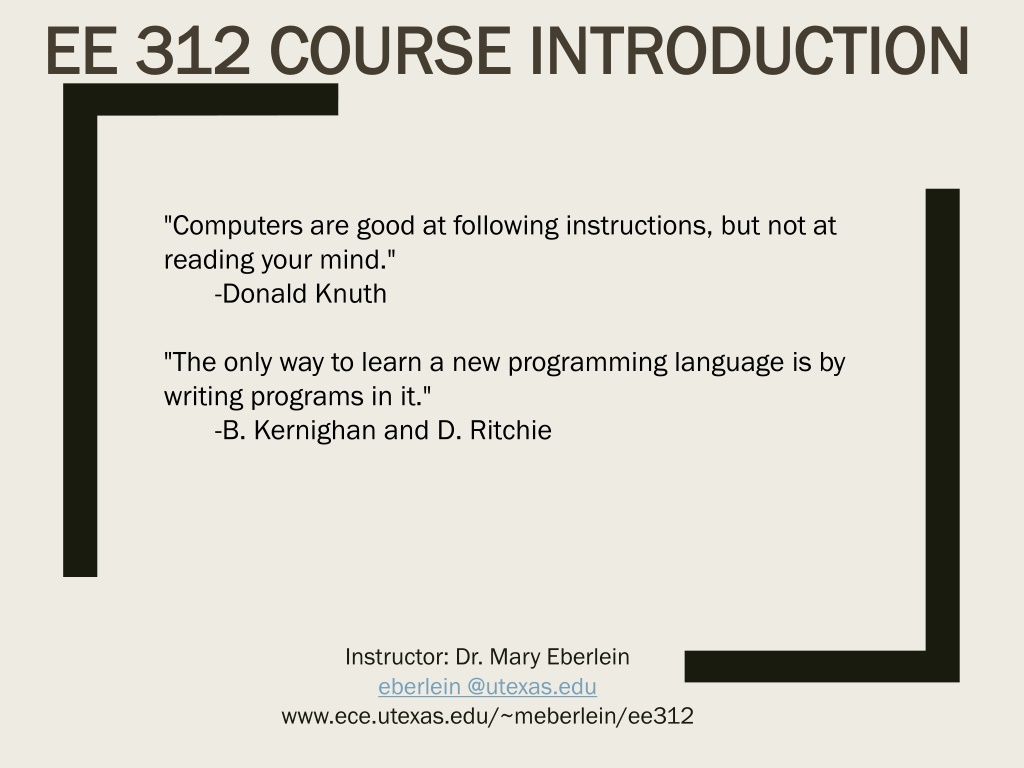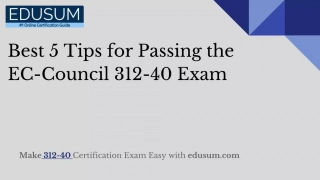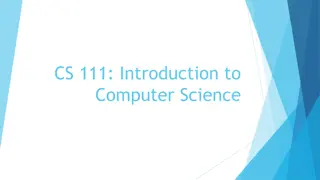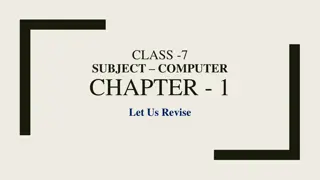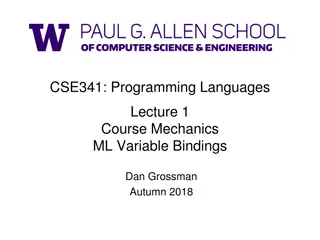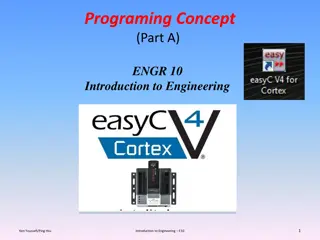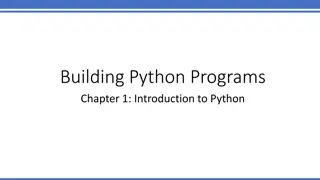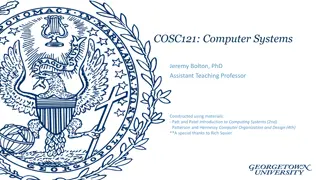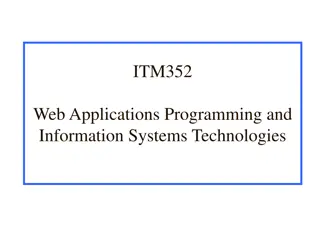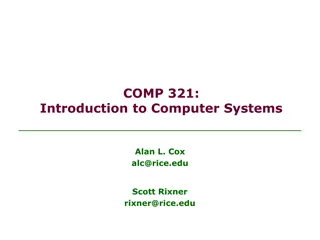Introduction to EE 312 Course and Computer Programming
Explore the introductory content for the EE 312 course featuring quotes by Donald Knuth and B. Kernighan. Get to know the instructor, Dr. Mary Eberlein, and the course objectives. Discover the teaching team, communication methods, and tips for success in the course. Dive into programming basics and the syllabus for a fulfilling learning experience in computer programming.
Download Presentation

Please find below an Image/Link to download the presentation.
The content on the website is provided AS IS for your information and personal use only. It may not be sold, licensed, or shared on other websites without obtaining consent from the author. Download presentation by click this link. If you encounter any issues during the download, it is possible that the publisher has removed the file from their server.
E N D
Presentation Transcript
EE 312 COURSE INTRODUCTION EE 312 COURSE INTRODUCTION "Computers are good at following instructions, but not at reading your mind." -Donald Knuth "The only way to learn a new programming language is by writing programs in it." -B. Kernighan and D. Ritchie Instructor: Dr. Mary Eberlein eberlein @utexas.edu www.ece.utexas.edu/~meberlein/ee312
Startup Startup www.ece.utexas.edu/~meberlein/ee312 Read the syllabus & look over schedule Explore class webpage & Canvas Sign up for class discussion group on Piazza Let the adventure begin...
Plan of the Day Plan of the Day Introductions Communication How to Succeed Course Topics Syllabus Review C Basics
Who Am I? Who Am I? Associate Professor of Instruction in ECE Taught CS: Tennessee Tech, St. Ed's, UTCS Scientist and product workshop instructor, Software Engineering Technologies Education Math: BS, MS Computer Science: PhD (UT-Knoxville)
My Path to CS... My Path to CS...
Teaching Team Teaching Team Emma Niu (haoranniu @ utexas.edu) Danny Vo (danny.vo @ utexas.edu) Pranav Harathi (pranav.harathi @ utexas.edu)
Who Are You? Who Are You? Freshman? Sophomore? Junior? Senior? Prior programming experience: EE319k: C programming (C program structure, numeric types, numeric operations, I/O...) Java? C++? Python?
Communication Communication Piazza Use first for non-personal communication Use informative subject lines Email: TAs, me (eberlein @ utexas.edu) Subject: EE312: + <topic of message> Sign message (complete name) Office hours
Succeeding in the Course Succeeding in the Course Randy Pausch, CS Professor at CMU said: "When I got tenure a year early at Virginia, other Assistant Professors would come up to me and say, 'You got tenure early!?!?! What's your secret?!?!?' and I would tell them, 'Call me in my office at 10pm on Friday night and I'll tell you.' " A lot of people want a shortcut. I find the best shortcut is the long way, which is basically two words: work hard.
How to Succeed in 312 How to Succeed in 312 "I would like to offer some advice about how you can best learn [this subject]. You will learn the most by actively working exercises. I suggest that you solve as many as you possibly can. After working the exercises your instructor has assigned, I encourage you to solve additional exercises..." -- Kenneth H. Rosen, in foreword of his textbook Discrete Mathematics and Its Applications "The key question to keep asking is, Are you spending your time on the right things? Because time is all you have." -- Randy Pausch, The Last Lecture Course is cumulative material builds on earlier concepts Learn by doing Write lots of code Do the readings Ask for help: instructor, TAs, tutoring Run the code examples yourself Experiment. Change things. Break the code! Attend lecture and discussion sections. Pay attention. Participate. Start programming assignments early Get to know your classmates. Form exam study groups. Attend office hours
Software Design & Implementation Software Design & Implementation I I Writing algorithms to solve problems Problem decomposition Structured programming in C and C++ Introduction to software design principles Introduction to SWE tools (version control, makefiles, debuggers, etc.) Elementary data structures Analysis of algorithm efficiency Builds on EE306, EE319k have clear idea of processor-memory interaction, basic instructions, ALU, RAM, etc. Foundation for EE422C, all other SWE classes many non-SWE classes as well, e.g., Computer Architecture Prereqs: BME 303 or EE 306 EE 319k
Software Engineering SWE: the science of building high quality software systems Why is Software Development so hard? Changing requirements Overwhelming complexity of large systems Poor software development processes Ex: Recent release of Eclipse, a Java development environment: 1.3 million lines of code Effort: 400 person-years 17,000 classes 15,000 inheritance relationships 124,000 methods Development cost: $54 billion Bugs: 40,000
Why is Software Engineering Important? Cost of getting it wrong: horrendous Time and money wasted Profit depends on producing software efficiently, minimizing maintenance work Broken software kills or harms Bugs in Therac-25 software results in massive overdoses of radiation, killing cancer patients (1985) Ariane 5 software bug results in loss of $500,000,000 spacecraft
Grading Grading Recitation section assignments go to your section Quizzes (announced or unannounced) go to your lecture and recitation section Programming projects Must work on the ECE 64-bit Linux machines Code that does not compile will get a 0 Two midterms 10/10, 11/19 (subject to change) conflict? email me ASAP Final exam optional If you don't take it, I will use the average of your midterm exam grades as your final exam grade. If you take the final, your grade will be used to calculate your course grade. Grades posted on Canvas maintained by the TA who leads your recitation section
Programming Projects Programming Projects Start out easy but get much, much harder Individual unless otherwise specified do your own work usually ok to share tests you write (Piazza) Programs checked automatically with plagiarism detection software MOSS is very effective at detecting cheating on projects Cheating on Project 0 for all all Project grades & referral to Dean of Students Turn in the right thing correct file name, correct format or you will lose points Slip days 4 for term, maximum 2 per assignment don't use frivolously plagiarism detection software
Quizzes & Assignments Quizzes & Assignments 5-10 minute quizzes in lecture, recitation Announced or unannounced Often on Canvas Assignments to complete before or in recitation, lecture Won't always be graded
